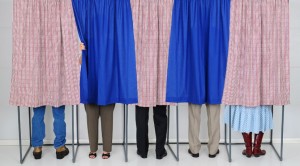Here’s How Humanists Voted: Survey Results from the American Humanist Association

After the 2016 presidential election, the American Humanist Association asked its members and supporters to fill out a survey in which they anonymously reported who they voted for and how they identify, whether as an agnostic, atheist, humanist, freethinker, secular, nonreligious, or other. The survey received an outpouring of responses (over 5,000), which we’ve broken down in the table below.
| Agnostic | Atheist | Humanist | Secular | Freethinker | Nonreligious | Other | ||
| Trump | 11 | 48 | 12 | 3 | 12 | 5 | 0 | 91 |
| Clinton | 280 | 2,183 | 1,423 | 195 | 194 | 233 | 75 | 4,583 |
| Johnson | 4 | 92 | 47 | 7 | 7 | 10 | 6 | 173 |
| Stein | 13 | 100 | 69 | 8 | 40 | 13 | 11 | 254 |
| Other | 1 | 27 | 17 | 0 | 5 | 4 | 4 | 58 |
| Didn’t vote | 4 | 32 | 28 | 5 | 7 | 5 | 2 | 83 |
| 313 | 2,482 | 1,596 | 218 | 265 | 270 | 98 | 5,242 |
According to the results, 87 percent of respondents, regardless of their identification, voted for Democratic candidate Hillary Clinton. Five percent of respondents voted for Green Party candidate Jill Stein, and 3 percent voted for Libertarian candidate Gary Johnson. The 2 percent who voted for Republican Party candidate Donald Trump tied with the 2 percent who didn’t vote, while 1 percent of the respondents marked the candidate that they voted for as “Other.” Of our respondents, the largest percentage (47 percent) identified as atheist, with the next largest percentage (30 percent) identifying as humanist. Approximately 6 percent of respondents identified as agnostic, while 6 percent identified as nonreligious, five percent identified as freethinkers, four percent as secular, and two percent marked their identity as “Other.”
These responses appear to be in line with findings from the Pew Research Center, which reported in February that individuals who identify as atheist or agnostic or “nothing in particular” are more likely to also identify as Democrats or to lean toward Democratic candidates. (Unfortunately, Pew Research Center does not yet seem to give people the option to identify as humanist in its surveys.) Pew also finds that the religious “nones,” including atheists and agnostics as well as those who don’t identify with any religion, make up the largest religious group within the Democratic Party; 28 percent of Democrats and those who lean Democrat are nones.
As the nonreligious percentage of the United States population continues to grow, our political influence can continue to grow as well, but only if we make our voices heard. Already, numerous humanist, atheist and secular organizations, including the American Humanist Association, are gearing up for the assaults on Jefferson’s wall separating church and state that are expected during a Trump administration. Numerous other groups with similarly progressive values, from the reproductive rights and racial justice sectors to the LGBTQ equality and labor movement sectors, are also preparing themselves to defend our rights, our civil liberties, and the advances that we have made in the past several years. Only by getting involved in the political process can we make sure that our voices are heard and that atheists, humanists, agnostics, secularists, freethinkers, and the nonreligious can have a big impact on US politics moving forward.
